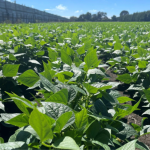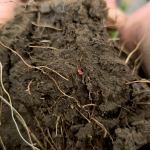Rethinking Soil: AgResearch Investigates the Hidden Power of Microbiomes in Boosting Pasture Productivity
Added 10 months ago

AgResearch is delving into the complex relationship between plants and soils, with a focus on how to harness and manipulate the soil microbiome to tackle some of New Zealand’s persistent agronomic challenges.
David Wright, science team leader for microbial solutions at AgResearch, said that despite increasing inputs like nitrogen fertilisers, productivity gains in New Zealand pastures have stalled.
“For years, plant breeding has largely ignored the vital role of microorganisms that live in and around plant roots, even though these microbes perform essential functions,” Wright explained.
Recent data reported by Farmer’s Weekly highlights a concerning plateau in pasture productivity over the past two decades, despite intensive use of nitrogen and increased livestock numbers. Wright suggests this could be masking deeper issues linked to soil health and microbial activity.
“We’re putting more nitrogen into the system, but seeing diminishing returns. This raises the question: are we overlooking underlying issues related to the soil microbiome?” he said.
AgResearch is now investigating how plants interact with the soil microbiome—how they ‘select’ beneficial microbes, how these communities can be introduced or supported through inoculants, and how to manage these interactions to improve outcomes.
Rather than relying on single-strain microbial products, the use of microbial consortia—communities of organisms that work synergistically—may offer more comprehensive and lasting benefits.
Wright noted that the importance of healthy microbiomes becomes even more apparent under stressors like climate change, where resilient soils can significantly boost plant health and productivity.
Microbiomes may also help tackle pest issues in the future. With the Environmental Protection Authority proposing a ban on chlorpyrifos—a pesticide used to control the pasture-damaging grass grub—biological solutions are gaining traction.
AgResearch, in collaboration with agricultural chemical companies, is making progress on a biological alternative to control grass grub, which could replace synthetic pesticides with eco-friendlier options.
Wright said upcoming regulations limiting fertiliser and chemical use will likely accelerate the shift toward biological products, especially as environmental concerns grow among consumers.
He will be joining a panel at the Southern AgriTech Innovation Day in Southland this May to explore whether New Zealand’s pasture and forage production has reached its ceiling—and whether the soil microbiome could hold the key to future breakthroughs.
Be the first to leave a comment.
Leave a comment
All comments are reviewed before they are published on the website. Your email address will not be published.

Carbon Positive Trial Update – February 2025

Carbon Positive Update

Community Engagement and Knowledge Sharing Strengthen the Carbon Positive Project

Are We Changing Soil Carbon Yet? Three Years In, the Jury’s Still Out

Farewell to Trustee Phil Schofield – A Foundational Leader of the HBFFCT


Join the conversation